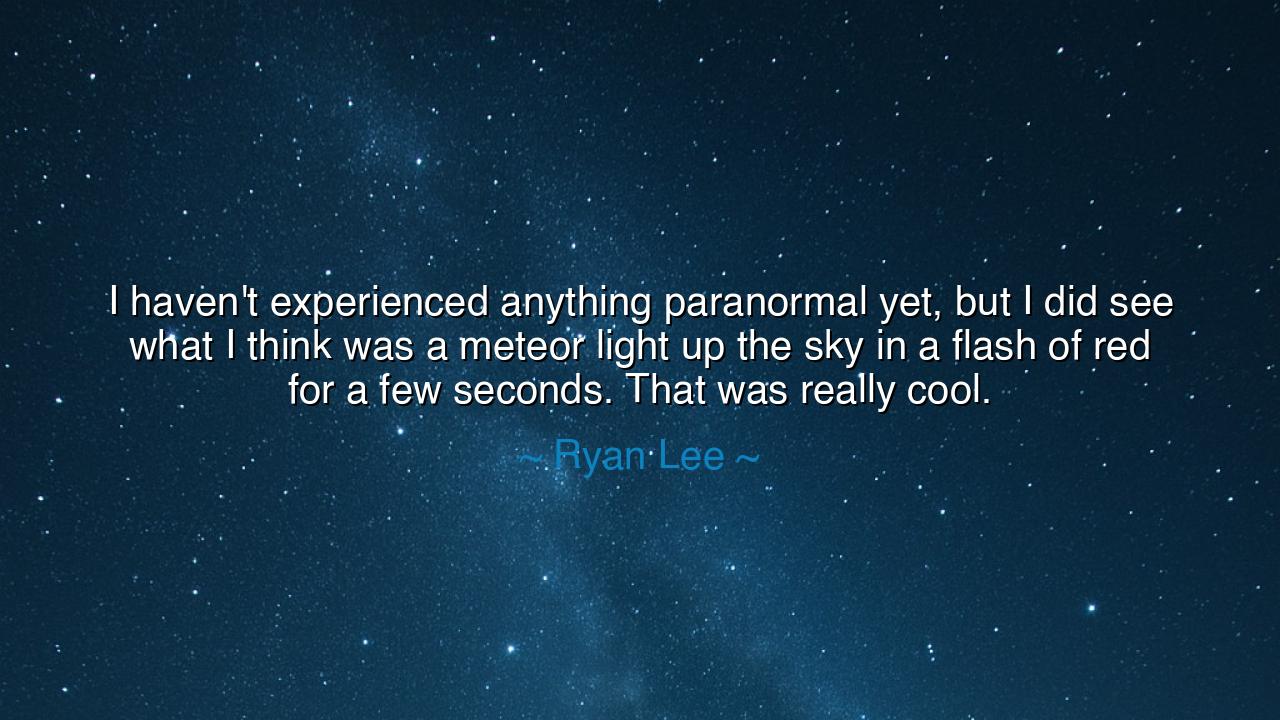
I haven't experienced anything paranormal yet, but I did see what
I haven't experienced anything paranormal yet, but I did see what I think was a meteor light up the sky in a flash of red for a few seconds. That was really cool.






The actor Ryan Lee once said, with a tone of wonder both humble and pure: “I haven't experienced anything paranormal yet, but I did see what I think was a meteor light up the sky in a flash of red for a few seconds. That was really cool.” Though these words seem light-hearted, there is a quiet profundity hidden within them. They speak not of ghosts or mysteries beyond reason, but of the simple, awe-inspiring marvels of the natural world—moments that awaken in the human heart the same reverence once felt by our ancestors when they looked upward and beheld the infinite. His reflection reminds us that life need not be supernatural to be miraculous; that wonder is not found in fantasy alone, but in the very sky above us, if only we lift our eyes to see it.
In the manner of the ancients, let us first understand what is meant by the meteor that Lee describes. A meteor is but a fragment of the cosmos, a fleeting traveler from the deep. It enters our atmosphere for a heartbeat of time, burning in brilliant color before dissolving into darkness. To many, it is merely a scientific event; to the wise, it is a symbol of revelation—the meeting point between eternity and the present moment. When Lee speaks of the red flash lighting up the night, he speaks to the eternal truth that beauty often comes suddenly, without warning, and departs just as quickly. The ancients, gazing upon such a sight, would have called it a sign from the heavens; today, we call it a moment of awe. But in truth, they are one and the same.
The origin of Lee’s words lies not in mysticism, but in sincerity. He admits that he has not encountered anything paranormal—that is, anything that defies the laws of nature or reason. Yet, rather than lament this, he celebrates what he has seen: a natural wonder that ignited his imagination. This humility of spirit is rare in an age that seeks spectacle over substance. He teaches, perhaps unknowingly, that one need not chase ghosts or miracles to experience the extraordinary. For those with eyes open to the world, even a meteor’s brief passage becomes a spiritual moment, a reminder that we are small in body but vast in our capacity for awe.
Consider, for a moment, the story of the ancient astronomers of Babylon and Greece. They too spent their nights beneath the stars, not as dreamers of the supernatural, but as seekers of truth within creation. When a meteor blazed across their sky, they recorded it with devotion, seeing it as a message not of fear but of knowledge. It was through their wonder—through countless gazes at the heavens—that humankind first began to understand its place in the universe. Their discoveries, born of simple observation, gave rise to science, navigation, and art. From such moments of beauty came civilization itself. Thus, the meteor that Ryan Lee beheld is not a mere flash of light—it is part of a lineage of wonder that stretches across millennia.
There is a deep wisdom in his casual remark, though it may seem simple. When he says the experience was “really cool,” he speaks in the language of modern joy, yet beneath it lies the same impulse that led the ancients to build temples to the stars. It is the human longing to connect with something larger—to feel the vastness of creation pressing gently against the walls of our perception. The meteor becomes a metaphor for those fleeting moments of transcendence that pierce the ordinary: a child’s laughter, a sudden kindness, a sunset that halts us mid-step. In every age, such flashes remind us that the sacred dwells within the natural.
O seekers of meaning, take this lesson to heart: you need not wait for the supernatural to find wonder. The universe itself is enough. Every day offers its own miracle for those who notice—the wind through the trees, the fire of the stars, the beating of your own heart. Do not live asleep beneath the heavens while longing for signs beyond them. Be awake to the beauty of what is, and you will find that the world itself is a cathedral, and your life, a prayer of awe.
And so, let us end as we began—with gratitude for the fleeting meteor, for the flash of red that Ryan Lee once saw. Let it remind us that the divine is often hidden in the simple, and that moments of wonder, however brief, leave behind eternal light within the soul. Lift your gaze, therefore, from the ground to the sky; seek not the unnatural, but the truly real. For when you do, you will see that every night sky holds a promise: that even in the vast silence of the cosmos, beauty will still find you—and for a few sacred seconds, illuminate your world.






AAdministratorAdministrator
Welcome, honored guests. Please leave a comment, we will respond soon